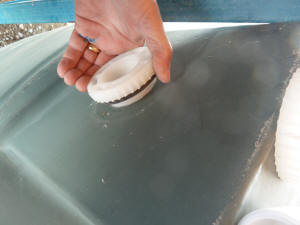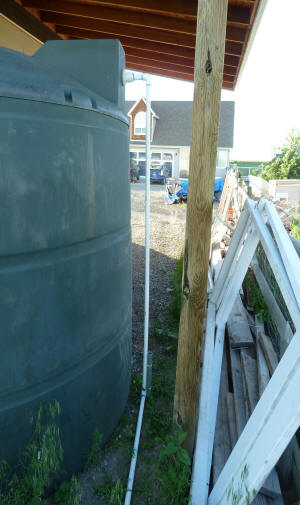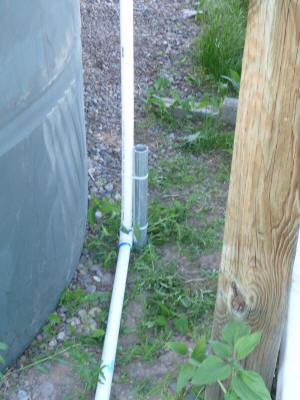
Search
The Renewable Energy site for Do-It-Yourselfers
A Medium Sized Rain Water Collection System
-- Overflow System
|
This page covers building the overflow for the
rain water collection system.
 The tank needs to have an overflow system of some type to handle the
situations where the tank fills up with harvested rain water and needs to have a
way to get rid of the excess.
We drilled a hole in the side of the tank up toward the top and attached a
drain pipe to this that pipes the water out away from the tank.
|
|
Overflow System
We used a plastic bulkhead fitting to make a tight connection of the overflow
pipe through the tank wall. Since our tank did not already have
penetration for a drain pipe, we drilled a hole to fit the bulkhead fitting
through. Once the bulkhead fitting was in, a threaded adaptor
was used screwed into the bulkhead fitting, and then 1 inch PVC pipe was solvent
welded into the bulkhead fitting. The PVC drain pipe was extended down the
tank and then out away from the tank a ways. The pictures below show the
construction.
The plan is to extend the overflow pipe out to the nearby trees to provide
them with some additional water.

Drilling the hole for the bulkhead fitting -- this is
a wood boring drill in a brace.
Be careful not to let the plug drop into the tank. |

The bulkhead fitting. Note that since I could not
access the back side of the fitting, I just relied on
screwing the front half of the bulkhead fitting into
the tight fitting hole and sealing it with silicone -- this was
fine for a connection that is above the normal water line. |

Overflow pipe. |

Ground support stake for overflow pipe. |
It may be that we skimped a little on the overflow pipe diameter. With
just gravity flow and the water level building up to (say) 6 inches above the
overflow pipe, the flow rate will only be about 2 gpm. With a heavy rain
(say 1 inch per hour), the flow rate would need to be about 10 gallons per
minute. In order to push 10 gpm through the 30 ft of 1 inch overflow pipe,
the head would have to be about 2 ft of water. So, the tank would have to
fill and slightly pressurize itself to get the flow out the overflow up to what
a heavy rain would bring. This is probably OK as 2 ft of head should
not bother the tank, but perhaps going up to a 1.5 inch overflow line would have
been better.
Go on to system performance and cost page...
Back to the main page for this project...
Comments or questions...?
Gary July 3, 2011

